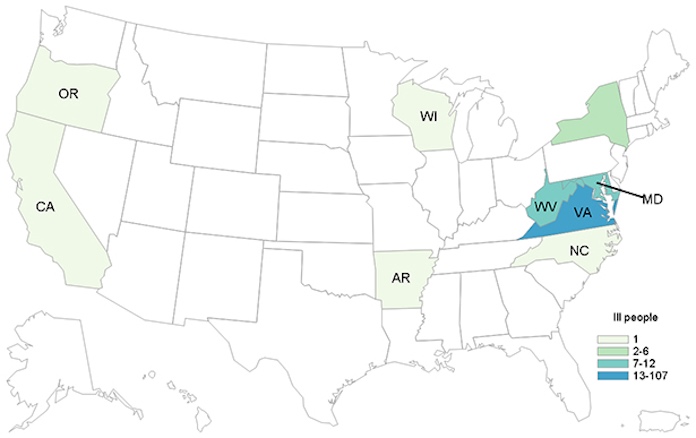The Centers for Disease Control and Prevention (CDC) is updating its investigation into the hepatitis A outbreak linked to frozen strawberries imported from Egypt. As of October 17, 2016, 134 people with the illness have been reported from nine states.

The outbreak case count by state is: Arkansas (1), California (1), Maryland (12), New York (3), North Carolina (1), Oregon (1), Virginia (107), West Virginia (7), and Wisconsin (1). Fifty-two ill persons have been hospitalized. No deaths have been reported. The patient in Oregon purchased smoothies from a Tropical Smoothie Cafe in Virginia while traveling.
The outbreak case count is so high in Virginia because Tropical Smoothie Cafe restaurants in that state, as well as in Maryland, North Carolina, and West Virginia, received the frozen strawberries from Egypt that were named as the “likely source” of this outbreak. When Tropical Smoothie Cafes removed the strawberries from their chain in those states and the outbreak went beyond the incubation period, the numbers of ill persons started decreasing.
In interviews, nearly all patients reported drinking smoothies containing strawberries at Tropical Smoothie Cafe locations before August 8, 2016 in those four states. There is no ongoing risk of hepatitis A virus infections at these restaurants, according to the CDC report.
Investigators are working with Egyptian authorities to find out which specific lots were contaminated with the virus and if they were sold to other customers in the U.S. Frozen strawberries used at Tropical Smoothie restaurants were collected for testing; the analysis is ongoing.
It has been 74 days since Tropical Smoothie removed the strawberries from their restaurants. The longest incubation period for hepatitis A is 50 days, so we are outside the initial incubation period. But this illness can be spread person to person, so secondary infections may still continue to be reported.
The symptoms of hepatitis A include jaundice (yellowing of the eyes or skin), abdominal cramps, clay colored stools, dark urine, weight loss, loss of appetite, joint pain, nausea, vomiting, and fever. People usually get sick 15 to 50 days after exposure to the virus. Most people recover after a few weeks or months of illness, but some, especially the elderly and those with chronic liver disease, may become very sick.
Food handlers and restaurant employees should contact their doctor and stay home if they contract this illness to help prevent it from spreading. The best way to prevent the spread of this illness is to stay home when you are sick. Do not prepare or serve food to others if you are sick. And always wash your hands well after going to the bathroom, taking care of someone who is ill, and preparing food or drink for others.
Hepatitis A cases and outbreaks have decreased dramatically in the last ten years because of vaccination programs and policies. The hepatitis A vaccine is recommended as part of childhood vaccination routines and for adults at risk. Anyone who travels to a foreign country with high rates of this illness, people with chronic liver disease, and those who work in the restaurant or health care industries are encouraged to get this vaccination.




